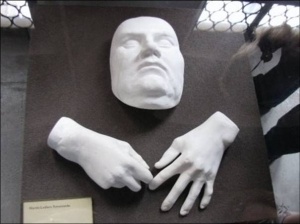© R. S. Clark, 2000; 2014. I Luther’s Critique of Erasmus (2/3) II Luther’s Positive Development of the Doctrine of Predestination from SS (1/3) Major propositions: 1 A fallen sinner is totally unable to cooperate with divine grace. 2 Salvation is exclusively . . . Continue reading →
Luther
A Topical Index To Luther’s Sermons
Trans. J. N. Lenker et al. (Grand Rapids: Baker, 2001) prepared by Shane Lems, M.Div © 2007 Shane Lems. All Rights Reserved. Usage: You may link to this index but it may not be copied wholesale without the permission of the author . . . Continue reading →
Luther On The Covenant Of Works
Before Adam’s fall it was not necessary for him to have Christ, because he was righteous and without sin, just as the angels have no need of Christ. If Adam had not fallen, it would not have been necessary for Christ to . . . Continue reading →
Luther: Right Understanding Of Justification leads To True Sanctification
When I was a monk, I thought by and by that I was utterly cast away, if at any time I felt the lust of the flesh; that is to say, if I felt any evil motion, fleshly lust, wrath, hatred, or . . . Continue reading →
What’s Wrong With Reformation Day? (UPDATED)
Each year on this date confessing Protestants remember Martin Luther’s protest against the abuse of indulgences. He followed the academic custom of the day by compiling a list of theses, short statements or claims. Sometimes one would follow from the other but . . . Continue reading →
Calvin: The Lutherans Belong To The Church And We Are Their Members
It cannot be too strongly emphasized at the outset that Calvin did not think of himself as “Reformed” in the sense of inner-Protestant polemics. Calvin was not a Calvinist but an Evangelical, and what he thought about Luther can only be understood . . . Continue reading →
What Luther Meant And Didn’t Mean About The Holy Spirit Preaching
Luther wrote a little booklet entitled “A Simple Way to Pray” and Keller makes extensive use of it. Near the end of chapter 6, he mentions that Luther taught that one should always be alert and ready to hear the preaching of . . . Continue reading →
See To It That You Remain In God’s Word Like A Child In The Cradle
See only that you pay heed to God’s Word and remain in it, like a child in the cradle. If you let go of it for a moment, then you fall out of it. This is the devil’s sole aim, to tear . . . Continue reading →
The Difference Between Sola Scriptura And Biblicism
The Reformation solas (by grace alone, through faith alone, according to Scripture alone) are not well understood today. Yesterday, however, was the anniversary of Luther’s famous declaration at the Diet of Worms. Although already under ban for his teachings, Charles V had promised . . . Continue reading →
Heidelberg 92: What Is The Law Of God? (3)
There is a way of life, i.e., there is a way that believers live. There is a way of salvation, a path that believers walk toward eternal life, in the grace of Christ, in union with Christ. It is essential to distinguish, however, between is and through or because. The moralist wants to turn is into through or because. We are not saved through obedience. That is Romanism. We are not saved because of our obedience. That is sheer Pelagianism. Nevertheless, it is the case that those to whom God has sovereignly given new life, to whom he has given the grace of faith and through it union with Christ, will and shall seek to live, sola gratia, sola fide according to God’s moral law. Continue reading →
Heidelberg 114: Between Moralism And Antinomianism (2)
Paul was not a Gnostic, a Valentinian, an Anabaptist, a Familist, nor an Antinomian. He was a sinner saved and justified freely through faith alone, a Christian living in union and communion with Christ, seeking to bring his life into conformity to all of God’s holy moral law. Continue reading →
Luther On The Comfort Of Christ’s Return
45. Without a doubt, He has spoken this comforting word also for the fainthearted, who, though they are godly and prepared for the Last Day, are yet filled with great anxiety and [thus] hinder their desire for this coming, which is especially . . . Continue reading →
Luther On “Saints,” Monks, And Sola Scriptura
In the papacy there is a book containing the legends or accounts of the saints. I hate it intensely, solely for the reason that it tells of revolting forms of worship and silly miracles performed by idle people. These legends and accounts . . . Continue reading →
A Friendly Reply To Derek Regarding Calvin, Luther, And The Falling Of The Church
You can catch up with the flow of the discussion via Derek Rishmawy’s interesting essay but the short story is that Carl Trueman published an essay at First Things properly cautioning American evangelicals about re-making Luther into their own image and challenging . . . Continue reading →
Where Was Your Church Before Luther?
Josiah writes to the HB: Often when we think of the reformation we think back to 1517 when Martin Luther nailed the 95 Thesis on the church door in Wittenberg Germany but we describe it in such a way that it’s almost . . . Continue reading →
Luther Against Denying Communion In Two Kinds
I conclude, then, that it is wicked and despotic to deny both kinds to the laity, and that this is not within the power of any angel, much less of any pope or council. Nor does the Council of Constance give me . . . Continue reading →
The Freedom Of The Christian Man
There is a great lot of talk in the evangelical and Reformed world(s) about sola Scriptura but one has the growing sense that not only is the Reformation scripture principle not well understood (e.g., it is often misconstrued as an endorsement of . . . Continue reading →
Rutherford Defended Sola Scriptura, Luther, And The Law-Gospel Distinction Contra Antinomians And Anabaptists
Anno, 1522. Did arise in Saxony Nicholas Stork, who boasted of dreams and visions and rejected the Scripture as being a carnal and literal rule. Antinomians call it carnal, literal, and legal. From him and others arose Thomas Muntzer, about anno 1524, . . . Continue reading →
What Happened To Divine Immutability?
The biblical doctrine of God’s immutability says that God is always what he is. He is never any more or any less than he is. He is not becoming. He is not changing. He is utterly reliable. He is utterly perfect. He . . . Continue reading →
Canons Of Dort (13): The Doctrine Of Predestination Is A Mystery
It is a remarkable thing that, outside of Reformed circles, it seems to be widely assumed that the attraction of the doctrine of predestination is that it is reasonable. This is nothing but an assumption. The Reformed churches do not confess the . . . Continue reading →






